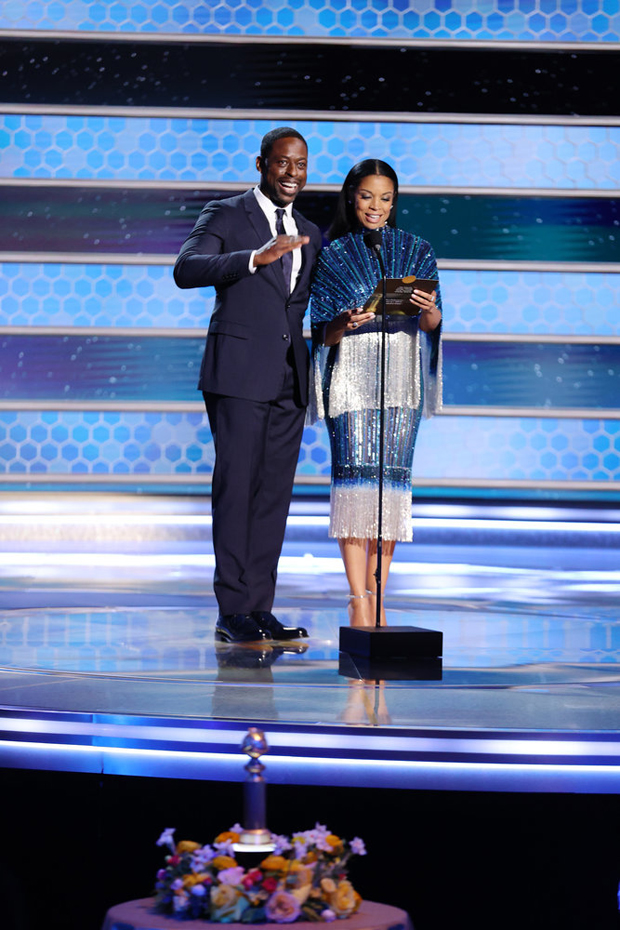
Sterling K. Brown continues to knock it out of the park every single week on This Is Us. Season 5 of the hit NBC series started out with Pearson brothers Randall and Kevin at odds, but they have slowly pieced their relationship back together. When HollywoodLife spoke EXCLUSIVELY with Sterling about what’s to come, he hinted at an episode that will explore Randall and Kevin’s history as brothers.
The Emmy and Golden Globe-winning actor also opened up about the revelatory New Orleans episode where Randall learned about his birth mother. After his “deeply spiritual” in the lake, Sterling revealed that “there’s space now for an exploration of faith” with Randall. In addition, Sterling spoke about his important work with Survivorship Today. Read our Q&A below.

Kevin and Rachel have now made amends after a very intense and rough patch. Randall came in clutch when Kevin needed him to with Madison, so what does their relationship like going forward?
Sterling K. Brown: That’s a good one. I’ll tease this bit. Episode 13, I believe, is sort of a history of the relationship between Randall and Kevin, and how they have throughout history shown up for each other and antagonized one another to no end. I think in sort of revisiting the history of their relationship, they recognize that there’s a pattern that has been at play. Maybe with a little bit of perspective and maturity, they can put a different framework around it. You have to know your history in order to learn from it. Because if you’re unaware of it, then you’re doomed to repeat it. I’m thinking there’s a possible turning point of real change in the near future. And then I’ll say that, and they’ll write something completely different, but I’m sticking to it for right now.
There was that really emotional phone call between the two of them. Kevin says he didn’t see a lot of what Randall was going through growing up. Randall tells Kevin that when he’s ready to have that conversation, they can have it. I feel like they have to have that conversation eventually.
Sterling K. Brown: I think at least the beginnings of a conversation because I think it’s sort of an ongoing thing the idea that race in America can ever be summed up in “an” conversation. I use that on purpose because I know it’s incorrect, but it’s funny to me. I think it’s a continuing dialogue that everyone has to be open to and be comfortable in their discomfort. It’s not always going to make people feel like in our 501, the first episode of the season, and the conversation between Kate and Randall. It’s not something that is always going to make people feel good, but I think we have to learn how to be comfortable with our discomfort.
The sixth episode of the season is just one of the most standout episodes of the entire show. It was just an amalgamation of love, loss, grief, pain, and forgiveness. Randall has that spiritual moment in the lake where he lets his pain go, and he has that connection to his birth mother. How will that experience in New Orleans shape him as a man and a father moving forward?
Sterling K. Brown: I think it’s pretty huge. My take as an actor may be slightly different than what the writers’ intention was. I’m not 100 percent sure, but I found it to be deeply spiritual. I think Randall is a man of silence who trusts his five senses. He doesn’t take his family to church frequently, what have you. But I feel like this spiritual moment, this idea or this ability to actually face his mother, which some people could say all happened in his head… I kind of choose to believe that he saw his mom in the water. He got a chance to hear her and tell her that she was loved and that he was loved by her. I think when that sort of spiritual presence is there, it increases the possibility of believing that there’s something that exists beyond the five senses. I think space and anxiety have a difficult time residing in the same space. We know Randall lives with anxiety, and we know that he does a lot of things to try to deal with it in the most healthy way possible. But the exploration phase has not been part of that process. I think maybe with that healing moment that he had with his mom there’s space now for an exploration of faith that I’m curious to see.
I love the dynamic that Malik and Randall have onscreen. I think Asante Blackk is just one of the most talented young actors out there. Will we see more of Malik and Randall? I feel like Malik is a bit of a reprieve for Randall since Randall’s the only man in the house.
Sterling K. Brown: I love when Blackk shows up. He makes me so incredibly happy. As a man in life who has two boys, we’re sort of running the Brown household, and my wife is the odd person out. In the Pearson household, it is dominated by women, and Randall’s sort of the odd person out. Malik has a very strong presence in the episode next week as well. He’s a phenomenally talented young man. He is a beautiful soul. He’s a beautiful person. It’s funny, Sue [Susan Kelechi Watson] and I will look at old pictures of our children. We’ll see Lyric [Ross] and Eris [Baker] and Faithe [Herman], and we’ll say, wow, we got a chance to watch these kids grow up over the course of five years. Now we get a chance to add Asante to that mix, and the idea that we will get a chance to say we got to work with them way back when because a lot of these kids are going to be around for a long time. I just look forward to seeing their stars shine brighter and brighter as time goes on.

When it comes to This Is Us, we have to talk about the flash-forwards. We finally saw the adult versions of Annie and Deja. Will we get more answers in a future flash-forward? There are a few people we haven’t seen yet.
Sterling K. Brown: There are a couple of people we haven’t seen. I think in that last flash-forward, we see somebody pulling up, but we don’t know exactly who that is pulling up. Right now at the house, we have Randall, we have Kev, we have the twins, we have Uncle Nicky, we’ve got Rebecca, and now we have Randall and Beth’s three children as well. So who’s left? There’s my sister. Clearly, there’s somebody else pulling up, and we will find out. Will we revisit the future in this season? I’m not sure. But in the sixth season, you’ll see more of that timeline for sure. It’s a time that we will continue to revisit throughout the course of the series. It’s like a little puzzle. You get little pieces in time and put it all together.
Do you personally know who’s pulling up or have they not even told you?
Sterling K. Brown: I know who’s pulling up, Avery. I’m just messing with you. Of course, I can’t tell you because then Dan [Fogelman] will be disappointed. I try to stay on his good side because he writes good stuff for me.
When This Is Us returns, Phylicia Rashad is back in the mix. How is Randall going to be navigating what’s going on between Beth and Carol?
Sterling K. Brown: It is the long-standing tradition in media to have problematic relationships with in-laws, and This Is Us shall continue that tradition because it’s just paying homage if you will. She comes to watch the kids when we go to New Orleans, and then she winds up staying with us a little bit longer than we anticipated. There’s a little bit of friction there. Mothers and daughters oftentimes can have difficult relationships, as seen between Rebecca and Kate who love each other immensely. But still, from time to time, there’s friction. You’ll see how that friction plays out in the quote-unquote Black Pearson household. Phylicia is a delight to be in the presence of, and the fact that I actually get a chance to call Phylicia Rashad my mother-in-law is a dream come true.

We last spoke in 2018 about Survivorship Today. A lot has changed since then. Over this past year, everyone’s lives have changed drastically. How has your work with Survivorship Today changed over the course of the pandemic?
Sterling K. Brown: It’s been really interesting. On a personal note, I used to be able to do the interviews in person with the cancer survivors. Now we’re doing them virtually so that we can be as respectful to their conditions and their safety as possible, not exposing them to any unnecessary risks. But I think it’s been eye-opening for me because the rest of the world is now living with a constant threat of an unknown disease and how it functions. I think the cancer community has had an intimate knowledge of what that means for a very long time. No one necessarily knows how cancer comes about, and the mystery of it all is something that is quite as frustrating as anything else. So on top of the pandemic that we’re all experiencing right now, they’re also trying to maintain their safety and security in the midst of just having a regular cancer diagnosis and cancer treatments, while also trying to safeguard from this pandemic, too. It’s an added layer that this particular community is facing that I find myself very much attuned to. When I hear people talking about “I don’t want to wear my mask because it’s affecting my right…” I think about how I go jogging. I jog with my mask and get frustrated sometimes because I know I can’t run quite as fast with it on as with it off. But I can still run. I can still appreciate the fact that my limbs are working, and I can share space with people in such a way that I’m not doing anything to infringe on anybody else’s right to life. It’s just sort of heightened my own sensitivity of what it means to be a good citizen, to be a good neighbor, to function in the community where you want everyone to thrive. So that’s on a personal level. I missed the people that I’ve gotten to know over the past few years. As we’re remembering a year now of a global pandemic, hopefully, within the next year with vaccines and whatnot things will start to resemble what they looked like before a year ago.
When you’ve been speaking to cancer survivors, what’s been the biggest pandemic challenge for them?
Sterling K. Brown: That’s a good question. Navigating when to go out, when not to go out. I’ve actually had a couple of conversations, and I want to highlight this because I was just on SurvivorshipToday.com and listening to the testimonials and this can-do spirit of “this too shall pass.” I actually had two family members with cancer diagnoses over the course of the past year. One’s passed away, and one is doing well. But one of the friends that I made over the course of being involved with Survivorship Today actually spoke to my family member because they both had prostate cancer. It was such a wonderful thing for this family member to receive someone’s insight on what it was that he was about to go through. It helped him tremendously to understand, okay, this is what I’m facing. Other people have had to go through it before. While I feel very much alone in this right now, I know that that is par for the course. And thus, I am now a part of a community, and this community can help me face this thing as I move forward. I’ve spoken to this woman, Donna, who was working for someone at the time, who wanted her to work outside of her house and wanted to be around her without a mask on and whatnot. I think it’s just the community of people that I’ve spoken to that Bristol Myers Squibb has put together are not people who live with the moniker of victim on their sleeve. They are survivors. They are people who are looking to make the most out of life as it is. They’re also very respectful of the fact that there are certain things that they have to do in order to give themselves the best chance at living the highest quality of life. I think over the course of the past year, they had to be very much unapologetic about this is what I need in order to feel secure and comfortable. You just draw the line, and after you make that choice, everyone else either agrees to see you and meet you where you are, or they don’t. And then you move forward. For those people who have had a cancer diagnosis and are survivors now, the respect for that added layer of safety that they’re trying to establish for themselves is something that I hope the world will be cognizant of.


